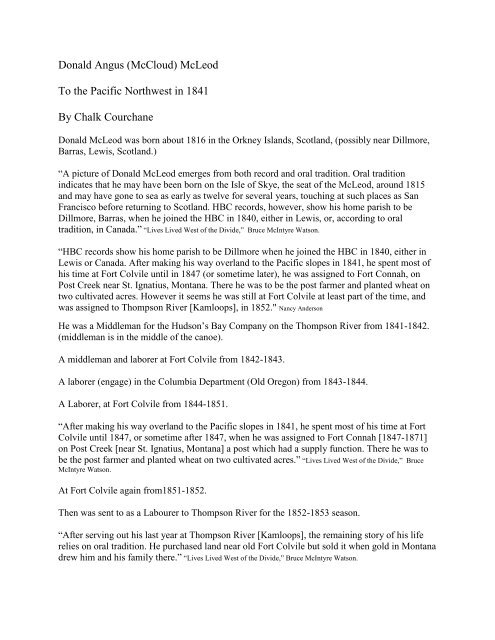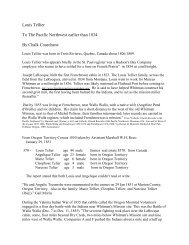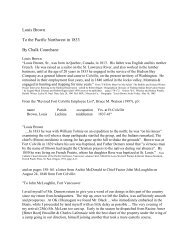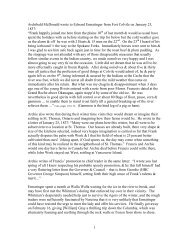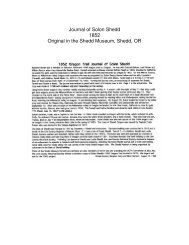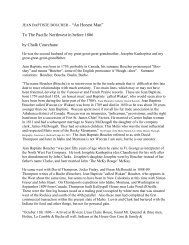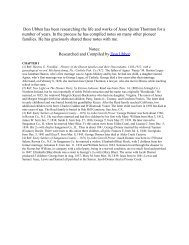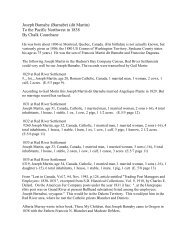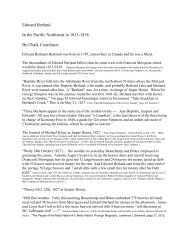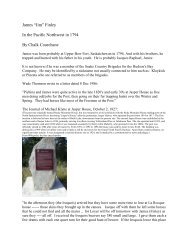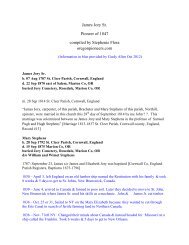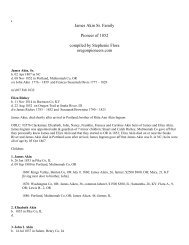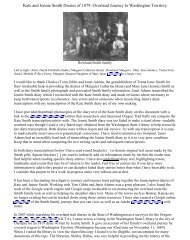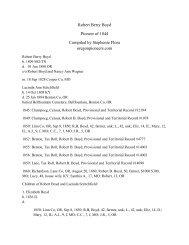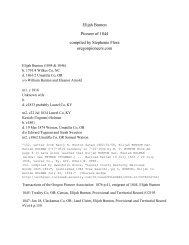Donald Angus (McCloud) McLeod To the Pacific ... - Oregon Pioneers
Donald Angus (McCloud) McLeod To the Pacific ... - Oregon Pioneers
Donald Angus (McCloud) McLeod To the Pacific ... - Oregon Pioneers
Create successful ePaper yourself
Turn your PDF publications into a flip-book with our unique Google optimized e-Paper software.
<strong>Donald</strong> <strong>Angus</strong> (<strong>McCloud</strong>) <strong>McLeod</strong><strong>To</strong> <strong>the</strong> <strong>Pacific</strong> Northwest in 1841By Chalk Courchane<strong>Donald</strong> <strong>McLeod</strong> was born about 1816 in <strong>the</strong> Orkney Islands, Scotland, (possibly near Dillmore,Barras, Lewis, Scotland.)“A picture of <strong>Donald</strong> <strong>McLeod</strong> emerges from both record and oral tradition. Oral traditionindicates that he may have been born on <strong>the</strong> Isle of Skye, <strong>the</strong> seat of <strong>the</strong> <strong>McLeod</strong>, around 1815and may have gone to sea as early as twelve for several years, touching at such places as SanFrancisco before returning to Scotland. HBC records, however, show his home parish to beDillmore, Barras, when he joined <strong>the</strong> HBC in 1840, ei<strong>the</strong>r in Lewis, or, according to oraltradition, in Canada.” “Lives Lived West of <strong>the</strong> Divide,” Bruce McIntyre Watson.“HBC records show his home parish to be Dillmore when he joined <strong>the</strong> HBC in 1840, ei<strong>the</strong>r inLewis or Canada. After making his way overland to <strong>the</strong> <strong>Pacific</strong> slopes in 1841, he spent most ofhis time at Fort Colvile until in 1847 (or sometime later), he was assigned to Fort Connah, onPost Creek near St. Ignatius, Montana. There he was to be <strong>the</strong> post farmer and planted wheat ontwo cultivated acres. However it seems he was still at Fort Colvile at least part of <strong>the</strong> time, andwas assigned to Thompson River [Kamloops], in 1852." Nancy AndersonHe was a Middleman for <strong>the</strong> Hudson’s Bay Company on <strong>the</strong> Thompson River from 1841-1842.(middleman is in <strong>the</strong> middle of <strong>the</strong> canoe).A middleman and laborer at Fort Colvile from 1842-1843.A laborer (engage) in <strong>the</strong> Columbia Department (Old <strong>Oregon</strong>) from 1843-1844.A Laborer, at Fort Colvile from 1844-1851.“After making his way overland to <strong>the</strong> <strong>Pacific</strong> slopes in 1841, he spent most of his time at FortColvile until 1847, or sometime after 1847, when he was assigned to Fort Connah [1847-1871]on Post Creek [near St. Ignatius, Montana] a post which had a supply function. There he was tobe <strong>the</strong> post farmer and planted wheat on two cultivated acres.” “Lives Lived West of <strong>the</strong> Divide,” BruceMcIntyre Watson.At Fort Colvile again from1851-1852.Then was sent to as a Labourer to Thompson River for <strong>the</strong> 1852-1853 season.“After serving out his last year at Thompson River [Kamloops], <strong>the</strong> remaining story of his liferelies on oral tradition. He purchased land near old Fort Colvile but sold it when gold in Montanadrew him and his family <strong>the</strong>re.” “Lives Lived West of <strong>the</strong> Divide,” Bruce McIntyre Watson.
"In 1847, <strong>Donald</strong> <strong>McLeod</strong> brought a herd of horses into <strong>the</strong> Lower Fla<strong>the</strong>ad Valley. TheHudson's Bay Company used <strong>the</strong> horses for pack trains to move supplies and furs in and out of<strong>the</strong> area.“After leaving <strong>the</strong> Hudson's Bay Company he put down roots in Bearmouth, on <strong>the</strong> MissoulaRiver, he ran a road house and ferry but was left bankrupt when his partner fled with all <strong>the</strong>assets. By 1870 <strong>the</strong> <strong>McLeod</strong> family was back in Stevens Country where <strong>Donald</strong> purchased aranch one mile west of Chewelah.” “Lives Lived West of <strong>the</strong> Divide,” Bruce McIntyre Watson. He farmed atColville in Washington before moving to <strong>the</strong> Fla<strong>the</strong>ad in 1885......." From "I Will Be Meat For My Salish" TheBuffalo and Federal Writers Project Interviews Relating to <strong>the</strong> Fla<strong>the</strong>ad Reservation - edited by Robert Bigart - Biographical Glossary of Fla<strong>the</strong>adIndian Reservation Names " by Eugene Mark Felsman and Robert Bigart (draft-1999) soon to be published. It had been published since I wrotethis.Talking about <strong>the</strong> early settlers of Colville Valley this was said, "The next settler was <strong>Donald</strong><strong>McCloud</strong>, who at that time resided where <strong>the</strong> buildings of <strong>the</strong> Catholic Sisters are now locatedabout two miles north of Chewelah. Mr. <strong>McCloud</strong> came here with <strong>the</strong> Hudson's Bay Co., as oneof its employees. He was a native of <strong>the</strong> Orkney Island of Scotland. He married a nativewoman. <strong>To</strong> <strong>the</strong>m a large family was born. The parents have passed away. The only member of<strong>the</strong> family now residing in <strong>the</strong> county is a daughter, Mrs. George McCrea of Chewelah. BothMr. and Mrs. <strong>McCloud</strong> were splendid citizens as were all <strong>the</strong> members of <strong>the</strong>ir family." FromSTEVENS COUNTY FIFTY YEARS AGO-by Thomas Graham (1928) p19."Hudson's Bay Company From an Interview with Alex <strong>McLeod</strong> as told to William S. LewisStevens CountyMy fa<strong>the</strong>r, <strong>Donald</strong> <strong>McLeod</strong>, was a Scotchman from <strong>the</strong> old country. He was engaged for servicein <strong>the</strong> Hudson's Bay Company and sailed from Glasgow, came out to Fort Garry, later known asWinnipeg, and was soon transferred across <strong>the</strong> mountains to Fort Colville, where he became <strong>the</strong>post farmer in <strong>the</strong> early '40's."I was born at Fort Colville on July 17, 1854. As a child I went to school with <strong>the</strong> children of<strong>Angus</strong> Mc<strong>Donald</strong>, <strong>the</strong> post trader. He had engaged a man known as "Doc" Perkins, to conduct<strong>the</strong> school in one of <strong>the</strong> trading post buildings. In later years this school teacher, Perkins, boughtand settled on a ranch on Walker's prairie, near <strong>the</strong> old Haines place."In those days <strong>the</strong>re were quite a number of 'sonapees' or white men employed about <strong>the</strong> tradingpost. I recall fa<strong>the</strong>r's assistant, a Frenchman John Jabbot (Jean Baptiste Chabotte); Joe Matt,blacksmith; [James] McKenzie, <strong>the</strong> post clerk, who afterwards married Mc<strong>Donald</strong>'s daughter,Christina; and Roderick <strong>McLeod</strong>, <strong>the</strong> Scotch herder who looked after <strong>the</strong> stock."The trading post proper was a square enclosure. The store and warehouses were on <strong>the</strong> northside and Chief Trader Mc<strong>Donald</strong>'s house was on <strong>the</strong> east side. The married employees, like myfa<strong>the</strong>r, lived outside <strong>the</strong> enclosed post yard on <strong>the</strong> south and west sides."As early as I can remember, white placer miners were mining gold long <strong>the</strong> Columbia river barsabove and below <strong>the</strong> trading post. They traded principally with Marcus Oppenheimer, whoopened a store in one of <strong>the</strong> old British boundary barrack buildings. The trade at <strong>the</strong> Hudson'sBay post was mostly with Indians.
"A man named 'Squaw' Brown also had a little store on this side of <strong>the</strong> present town of Marcus,some 300 or 400 yards from Marcus Oppenheimer's store. When <strong>the</strong> best part of <strong>the</strong> bars hadbeen worked out some years later, Chinamen replaced <strong>the</strong> white miners.” From TOLD BY THE PIONEERS,vol.1-3, 1937-1938, U.S. Water Projects Administration, Washington State. (note from Gene Felsman: "Found at Denver Public Library,Genealogy Section. Vol. 1, page 87-88, Vol. 3, pg. 144. This was obtained when I went to Graduate School at University of Denver.")Spokane & Stevens County Commissioner Journals (Minutes) Book A and Book B 1860 to 1893 transcribed by Sue Richart (2012): Bk A Page27Subject:And Wm Creggie for Spokane Precinct, D. R. Doyle, Hill, GoslinA new precinct is established and bounded as follows commencing at <strong>the</strong> mouth of Mill Creek running up said creek fifteen miles, <strong>the</strong>n to a pointon <strong>the</strong> Columbia River opposite Forlorn Hope Bar, <strong>the</strong>nce up <strong>the</strong> Columbia River to place of beginning, and called Liberty Bar Precinct.The following persons were appointed Grand Jurors for <strong>the</strong> next term of <strong>the</strong> district court: Magnus Flett, Thomas Brown, Chas Montgomery,John Campbell at Pend Oreille, Thomas Haller, John Duplissis, Joseph Lapray, Solomon Peltier, Patrick McKenzie, M. Hayden, Wm. Creggie, A.W. Compton, R. H. Douglass, <strong>Donald</strong> <strong>McCloud</strong>, John Inkster, Olin Lee, Henry Cook, Henry Lafleur. The Petit Jurors for <strong>the</strong> next term of <strong>the</strong>district court were appointed as follows: Henry Brown, Robert Lamphine, F. Wolff, James Kerr, John McDougald, Shepard Baley, H. Mills,Thos Leo, H. P. Stewart, George Taylor, Loui Peone, Henry Troutman. A. Charrette, John Campbell, Joseph Martin, Houston, Jacob Gillett, ThosReeves, Edward Hesenger, and Edward Cook. The County Treasurer is hereby ordered to pay to <strong>the</strong> order of <strong>the</strong> District Clerk, Fifteen Dollars,if that much is required to buy stationary. It is hereby ordered that <strong>the</strong> value of grain in this county shall be assessed as follows: Wheat 1.50 perbarrel, Oats, Barley, and Potatoes at 100 per barrel, Flour $8.00 per hundred.The taxes levied for county purposes shall be four mills on a dollar.F. W. Perkins is hereby appointed of Probate Judge for Spokane County be commissioned by <strong>the</strong> Governor. The assessment will presented byassessor examined and ordered completed, and turned over of <strong>the</strong> County Auditor Delinquent Tax for 1861 ordered entered as delinquent andunable to be collected.(Lined out: Joseph martin fined tax dollars for contemp of court). Sheriff L. T. Marshall called and assessment roll of 1862 examined and found$116.15 in his hands, which was ordred to be paid over to <strong>the</strong> County Treasurer, <strong>the</strong> tax returned and ordered collected.Sheriff ordered to go <strong>the</strong> Guard House to collect county property furnished prisoners.Bills against <strong>the</strong> county were presented, all bills in <strong>the</strong> Susan O'Brien case indefinitely postponed. Return of Road District No. 2 was presentedby <strong>the</strong> Supervisor Magnus Flett.Spokane & Stevens County Commissioner Journals (Mintutes) Book A and Book B 1860 to 1893 transcibed by Sue Richart (2012):Precinct No. 2, Kettle Falls Precinct, all that portion of Spokan County west of <strong>the</strong> west boundary line of Precinct No. 1.That <strong>the</strong> judges of <strong>the</strong> next election shall be for Precinct No 1 as follows: L. J. Demars, Thos Stranger, and Thos Farrell , For Precinct No. 2,Wheelock, <strong>Donald</strong> <strong>McLeod</strong>, and J. W. Crow.The board proceeded to divide <strong>the</strong> county into road districts which is as follows.Road District No 1 all that portion of Spokan County lying north of a line running east and west through <strong>the</strong> government brick yard.Road District No 2 all that portion of Spokan County lying south of said division line.John Duplissis appointed Supervisor for District No. 1.Charles Montgomery appointed Supervisor of District No. 2.On settlement with T. J. Demarce assessor <strong>the</strong> board allowed him for services as assessor 20 days at five dollars per day $100.00. Also a bill ofeight dollars for hise(?) cattle on wad(?) and twelve dollars for services as late County Commissioner, total amount of bill $120.On motion adjourned to meet tomorrow at 10 o’clock am.m.Geo Taylor, Chair Board of County CommissionersJ. R. Bates, Clerk, Board of County Commissioners"After leaving <strong>the</strong> Hudson Bay Company, <strong>Donald</strong> Sr. ran a road house and ferry at Bearmouthnear <strong>the</strong> Canadian settlement clustering around Deer Lodge on <strong>the</strong> eastern extremity ofWashington Territory, now Montana. During most of this intervening period, however, <strong>Donald</strong>had farmed in <strong>the</strong> Colville valley before moving with children and grandchildren to <strong>the</strong> Fla<strong>the</strong>adreservation in <strong>the</strong> mid-1880s, at <strong>the</strong> age of eighty." Washington Territory’s Tale of a Few Frenchtowns: and resettlementof <strong>the</strong> French-Breeds onto nearby reservations Robert Foxcurran 2010page 294According to one source “Probably in <strong>the</strong> late 1840’s, he took as his wife, Therese, a womanfrom <strong>the</strong> Nez Perce or Spokane nations. They had two children, Pierre Paul (1849-?) and Martine
Marceal (?). Around 1850, Therese, fate unknown.” “Lives Lived West of <strong>the</strong> Divide,” Bruce McIntyreWatson.He married Rosalie Morigeau on November 20, 1848 at St. Paul Mission, in WashingtonTerritory. Rosalie was <strong>the</strong> daughter of Francois Morigeau dit Forgues (1793-1870) and IsabelleMcTavish a Plains Cree. They had twelve children:1. Alexander Morigeau (1838-1938) he married Sophie LaFleur, <strong>the</strong> daughter of Joseph LaFleurand Marie "Sil-chim-i-tah" McKenzie. They had four children, including Hector <strong>McLeod</strong> whomarried Christine "Mourning Dove" Quintasket. Alexander also married a woman named Annie.2. Margaret M. <strong>McLeod</strong> (1855-) she married George F. C. McCrea.3. Frank (Francis) <strong>McLeod</strong> (1859-1921) he married Julia Ann King (1862-1941), <strong>the</strong> daughter ofPierre Roi (Roy) (dit King) aka Peter King and Mary Anne Finley.4. Elizabeth "Betsy" <strong>McLeod</strong> (1851-1891) she married Norbert Dupuis at ImmaculateConception Catholic Church, Colville, Stevens Co., Washington on January 2, 1865.5. Malcolm <strong>McLeod</strong> (1870-1944) he had two children.6. Alfred R. <strong>McLeod</strong>7. <strong>Donald</strong> <strong>McLeod</strong>8. Celeste M. <strong>McLeod</strong> (1861-) she married a man named Wolfe.9. Richard A. <strong>McLeod</strong> (1869/71-1945) he married Mercaline (Marcelline) Matt (1877-1902) <strong>the</strong>daughter of Alexander Matt and Angelic Prudhomme (Perdum). He <strong>the</strong>n married LillianElizabeth "Lilly" Couture (1885-1947) <strong>the</strong> daughter of Louis "Poo-quil-loos-toe" Couture andCecille Marengo.10. Colette <strong>McLeod</strong>11. Sophie <strong>McLeod</strong>12. Daniel <strong>McLeod</strong> (1866-1937) he married Ursula Gebeau (1879-1923) <strong>the</strong> daughter of Henry(Gibault) Gebeau and Cecille (Shaw) Neron.“In 1893, <strong>the</strong>n a widower of advancing age, he moved to Montana to be close to his sons, takingup residence at <strong>the</strong> Foot of <strong>the</strong> Lake, St. Ignatius. He died at his son’s home and was buried in<strong>the</strong> family plot at St. Ignatius Mission, Montana.” “Lives Lived West of <strong>the</strong> Divide,” Bruce McIntyre Watson.


